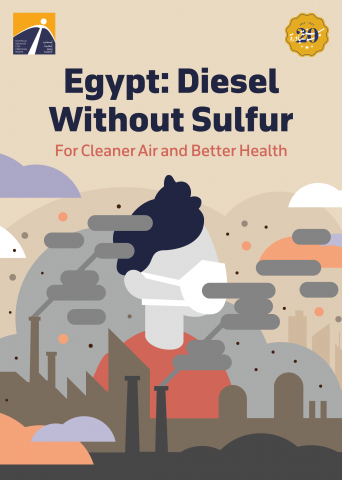EIPR issues a new research paper on the health and environmental necessity of desulfurization of diesel fuel in Egypt
Today, The Egyptian Initiative for Personal Rights (EIPR) released the English translation of its research paper, “Diesel without sulfur – for cleaner air and better health.” The paper is the third release in a series addressing the issue of air pollution in Egypt as the greatest environmental threat to public health. It focuses on unclean diesel fuel, whose exhaust fumes from burning cause lung cancer. In 2012, the World Health Organization announced the upgrading of the classification of diesel exhaust fumes from a “probable carcinogen” (Group 2A) to a “carcinogen” (Group 1).
Diesel without sulfur explains that air pollution levels in Egypt exceed standards recommended by the World Health Organization. Pollution levels also exceed the maximum permissible limits for the concentration of air pollutants stipulated in Appendix No. 5 of the executive regulations of Law No. 4 of 1994, as amended by Law No. 9 of 2009, although these legal standards are considered lax compared to international standards.
The paper mentions that the number of premature deaths due to air pollution in Egypt reached 67,434 in 2016 due to a 58% incidence of morbidity caused by heart disease, 18% due to stroke, and 24% due to lung disease and cancer, according to the World Health Organization. In addition, about two years of the life of every Egyptian is lost due to illness or health disability because of air pollution. Air pollution was also the cause of more than 12% of all deaths in Egypt during 2017, according to data from the Institute for Health Metrics and Evaluation (IHME).
Air pollution in urban areas is mainly caused by the burning of fossil fuel products such as diesel, gasoline, and gas. The health losses caused by air pollution from fossil fuels cost us more than EGP 100 billion, equivalent to 2.8% of 2018 GDP, according to a 2020 report by Greenpeace.
The Diesel Without Sulfur paper also analyzes how vehicle exhaust emissions are one of the most important factors causing air pollution in urban areas, where the number of vehicles is rapidly increasing. High-sulfur diesel fuel constitutes a major obstacle to reducing emissions associated with vehicles traveling on roads, where the high sulfur levels in the fuel lead to the ineffectiveness of the emission or exhaust control devices, which increases the pollutants resulting from internal combustion, and weakens the performance of these engines. In addition to the toxic effect of diesel exhausts that cause lung cancer, the components of diesel fumes produce what are known as "climate pollutants" such as black carbon or "black soot", which absorb sunlight and contribute to an increase in atmospheric temperature.
The paper also indicates that the concentration of sulfur in diesel fuel produced locally in Egypt reaches more than 5,000 parts per million, which is equivalent to 500 times the European Union's "Euro 5" standards, which do not allow concentrations higher than 10 parts per million. Egypt is considered one of the few countries lagging in taking decisive measures to improve the quality of diesel fuel, as it is ranked among 13 countries with high sulfur concentration in diesel fuel. Egyptian standards allow the production and import of high-sulfur diesel up to (10,000 parts per million), which is the highest permissible legal limit for sulfur concentration in diesel in the world.
Although the Egyptian government seeking to develop the petrochemical industry - according to a new strategy to develop it during the period 2020-2035 and updating it until 2040, with the aim of "achieving self-sufficiency, raising the quality of many petroleum derivatives and encouraging local manufacturing" - the new strategy does not prioritize decreasing sulfur levels in diesel to levels that enable us to reduce deadly emissions.
According to Diesel without sulfur, the proportion of sulfur in diesel is expected to reach 1,900 ppm by 2030, as specified by the current strategy, equivalent to 190 times European standards (Euro 5). The plans aim to develop the quality of diesel fuel by reducing sulfur to 10 parts per million in only 3 Egyptian oil refineries, which do not meet more than 45% of market needs, according to the Center for Environment and Development for the Arab Region and Europe (CEDARI).
In this context, the EIPR paper addresses the importance of improving the quality of diesel fuel as it is one of the main sources of pollution in urban areas, foremost reducing sulfur levels because it is the decisive factor for controlling pollutants emitted from vehicles. The paper sheds light on the impact of this kind of pollution on human health and the surrounding environment, and the resulting economic cost. It also reviews Egyptian policies related to fuel quality regulation. The paper presents recommendations to improve fuel quality and reduce air pollutants in order to protect the health of citizens and preserve natural resources.




